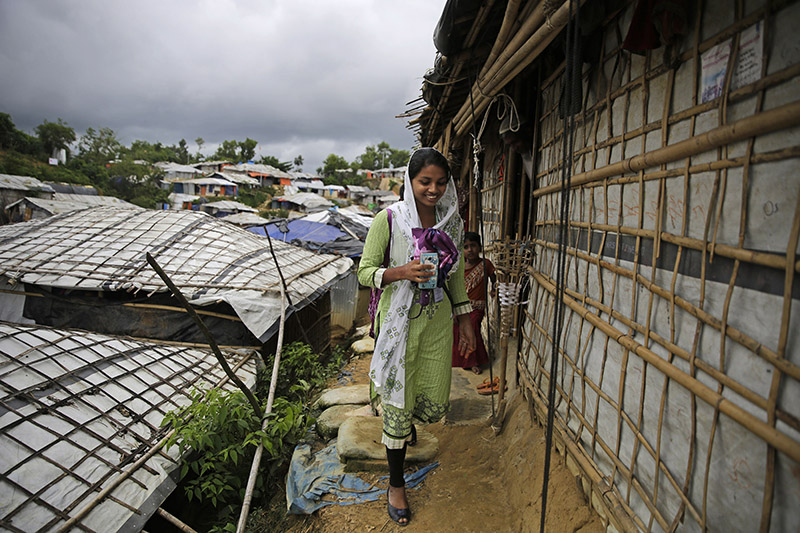From squalid refugee camp, Rohingya teen plans for higher ed
KUTUPALONG, BANGLADESH: At an age when many young Rohingya women have children, Rahima Akter has other plans.
From the refugee camp in southern Bangladesh where she was born, Akter, a 19-year-old with a confident smile who goes by the name Khushi, says she aspires to become the most educated Rohingya woman in the world.
Akter was born and has lived her whole life in the camp, a makeshift settlement of bamboo and tarpaulin huts spread out over rolling hills that were once protected forestland.
Her parents were among a wave of 250,000 Rohingya Muslims who escaped forced labour, religious persecution and violent attacks from Buddhist mobs in Myanmar during the early 1990s.
She sees education as her ticket out of the camp.
"If we take education then we will be able to lead our life as a life," she said.
Akter has supplemented her family's income by working as a translator for aid groups and journalists responding to a new influx of Rohingya refugees who have flooded the camp since August 2017, when the Myanmar military and Buddhist mobs began "clearance operations" against Rohingya in retaliation for insurgent attacks on security posts in Myanmar's Rakhine state.
A United Nations fact-finding mission reported last month that at least 10,000 Rohingya are believed to have died in the violence. The UN has called for Myanmar's top military generals to be prosecuted for genocide and crimes against humanity.
But while the Rohingya have found a measure of safety in southern Bangladesh, access to education is far from assured.
Akter said she is among only a few Rohingya refugee girls to have completed the Bangladeshi equivalent of high school, a feat she could only achieve by sneaking past the camp's checkpoints and bribing Bangladeshi public school officials for a placement.
More than 1,200 temporary schools teach English, math, Burmese, science and the arts to about 140,000 children between the ages of 6 and 14, just over a quarter of the more than half a million refugee children living in the camp, according to UNICEF.
But the schooling only goes up to 5th grade, so Akter and other refugees have had to secretly enroll in schools in Cox's Bazar or other towns to complete their studies.
Because of the limited educational opportunities for them, UNICEF calls the refugee children "a lost generation."
"The international community has failed these children," UNICEF spokesman Sakil Faizullah said, adding that the agency plans to start offering basic classes for older refugee students on the assumption they will receive formal education when they return to Myanmar.
But in the current anti-Rohingya climate in Myanmar, Akter said her family's return has not been possible.
In order to go to school, Akter said she disguised her Rohingya identity by speaking only in Bengali, and dressing like a Bangladeshi girl.
But it was the battles she had to fight at home that were the most challenging, she said.
Most Rohingya girls are expected to get married by the age of 16, and sometimes as early as 14. She had to fight off her father who said her time for marriage had come.
Akter cried for days and begged her parents with hands clasped to let her continue studying.
Her mother, Minara Begum, a refugee who fled Myanmar as a child and never attended school, not only convinced her husband to let their eldest daughter study, but also fought off rebukes from the elders in her community who warned that sending girls out into the world was a sin.
"I told them 'let Allah punish me then,'" Begum said. "What about our lives as refugees that have gone in vain because of our illiteracy? If I can help my children get a better future by education, then that is what I am going to do."
Begum now sends three of her four daughters to school and hopes to educate her youngest daughter and only son as well. Akter and two of her sisters live on their own near the school in Cox's Bazar, about two hours' drive from the camp. Akter's sisters were able to enroll in the Bangladeshi school after she had secured a place for herself there.
Begum said the family has skimped on food to cover the costs of sending the children to school, hoping that they can build a future for themselves that is not bound by the stigma of being a refugee.
"We are Rohingya. There is no land under our feet. We have no future. We are in the same situation as chicken in a cage," Begum said, adding that they "can't even claim ownership over the fruit from a tree that we planted."
Begum's dedication to her children's education seems to be paying off already. Akter now earns more money than the rest of her family's income combined.
While she is mostly busy preparing university applications, Akter also spends time going door-to-door at the expansive camp, documenting accounts of people who fled Myanmar last year.
She hopes to eventually publish her research when she is in college, where she plans to study human rights.
"Why do people have to lead their lives in such a situation?" she said. "One day maybe I'll be able to raise up my voice about human rights for the Rohingya."






